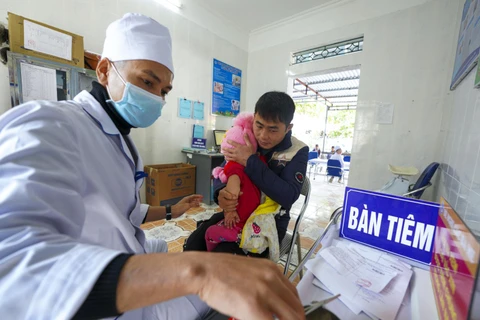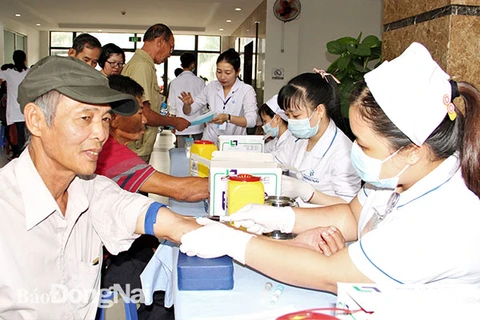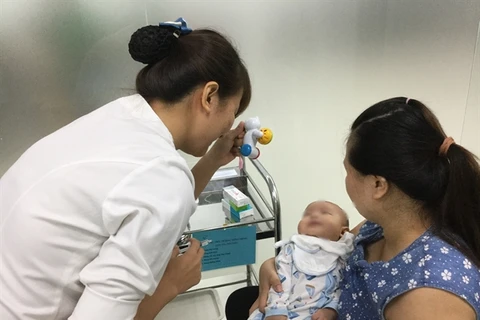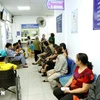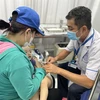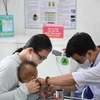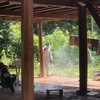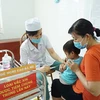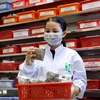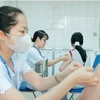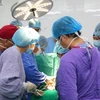 Deputy Health Minister Do Xuan Tuyen (standing) chairs an online meeting on communicable diseases and vaccinations on September 21. Health officials and workers from 700 locations across Vietnam joined the meeting, which also included updated treatment schemes for dengue and diphtheria. (Photo: VNA)
Deputy Health Minister Do Xuan Tuyen (standing) chairs an online meeting on communicable diseases and vaccinations on September 21. Health officials and workers from 700 locations across Vietnam joined the meeting, which also included updated treatment schemes for dengue and diphtheria. (Photo: VNA) Hanoi (VNS/VNA) - Vaccinations must take place safely and effectively, particularly in remote disadvantaged areas where vaccination coverage remained modest, Deputy Health Minister Do Xuan Tuyen said on September 21.
Speaking at a national online meeting on communicable diseases and vaccinations, Tuyen highlighted a diphtheria outbreak in Vietnam’s Central Highland region over the last few months which claimed four deaths. Most of the detected cases were people who had not been vaccinated.
“While Vietnam has done a good job in controlling COVID-19, we still face challenges in tackling other communicable diseases like dengue, measles, hand-foot-mouth disease and diphtheria,” he said.
Late this year and early next year, diseases could develop as wet weather creates favourable conditions for disease-causing virus/bacteria to develop.
“Vietnam has been implementing two tasks - disease prevention and control and socio-economic development as directed by Prime Minister Nguyen Xuan Phuc,” Tuyen said, emphasising that it was crucial to minimise the risks of other diseases that broke out at the same time.
“We need to analyse the development of each disease in specific areas to identify and solve any problems,” he said.
“As we follow these steps we are receiving recommendations for further effective disease prevention and control. Communication must be promoted for people to better understand and actively protect themselves from diseases,” Tuyen said.
Dang Quang Tan, head of the Health Ministry’s General Department of Preventive Medicine, said that since the beginning of this year, 198 diphtheria cases had been reported in Vietnam, including 172 cases in the Central Highland region, 22 cases in central provinces and four cases in southern provinces.
No cases had been detected in Vietnam’s northern provinces since 2015.
Of the reported cases, two people died in the Central Highland province of Dak Nong, one in Kon Tum and one in Gia Lai.
Notably, 161 cases had not been vaccinated.
In the first nine months of last year, only 41 diphtheria cases were reported, with three deaths.
“Most diphtheria outbreaks occur in remote disadvantaged areas that are home to ethnic groups, and they are usually unwilling to have vaccinations,” Tan said, adding that in some areas diphtheria had not appeared for a long time so grassroots healthcare workers lacked the experience to detect and diagnose the disease.
“Old people are becoming infected with diphtheria because they have not been. This is due to the ineffective implementation of the expanded national vaccination programme,” Tan said.
Even people who receive four diphtheria vaccine doses during childhood still need to have a booster shot as immunity against diphtheria is not sustainable.
Tan warned more diphtheria cases could be recorded and in areas where the vaccination programme had failed to reach.
Meanwhile, this year Vietnam has also reported nearly 70,000 dengue fever cases, of which 57 percent were detected in southern provinces, 32 percent in central provinces, 6 percent in Central Highland provinces and 4 percent in northern provinces.
The number of has fallen compared with the same period last year and the development of the disease was basically similar to previous years.
However, in the last two months, the number was increasing, Tan said, adding that as the rainy season arrived, the situation could become worse and more complicated, especially in central and southern provinces like Ben Tre, Binh Dinh, Binh Duong, Dong Nai, Gia Lai, Kon Tum, Khanh Hoa, Binh Thuan, Kon Tum, Long An, Phu Yen, Quang Binh, Tay Ninh, Tien Giang and HCM City. Hanoi is also a hot spot for dengue at this time.
“Preventive measures including intensive communication about killing mosquitoes and larva have been implemented but the disease has still broken out and spread,” Tan said, blaming the problem on poor public awareness.
For example, people, agencies and organisations had not effectively cooperated on disease prevention and control.
“Without drastic preventive measures, dengue could spread widely as Vietnam loosens social distancing and travel restrictions while weather in the next few months will be very favourable for mosquitoes to grow,” Tan said./.
Speaking at a national online meeting on communicable diseases and vaccinations, Tuyen highlighted a diphtheria outbreak in Vietnam’s Central Highland region over the last few months which claimed four deaths. Most of the detected cases were people who had not been vaccinated.
“While Vietnam has done a good job in controlling COVID-19, we still face challenges in tackling other communicable diseases like dengue, measles, hand-foot-mouth disease and diphtheria,” he said.
Late this year and early next year, diseases could develop as wet weather creates favourable conditions for disease-causing virus/bacteria to develop.
“Vietnam has been implementing two tasks - disease prevention and control and socio-economic development as directed by Prime Minister Nguyen Xuan Phuc,” Tuyen said, emphasising that it was crucial to minimise the risks of other diseases that broke out at the same time.
“We need to analyse the development of each disease in specific areas to identify and solve any problems,” he said.
“As we follow these steps we are receiving recommendations for further effective disease prevention and control. Communication must be promoted for people to better understand and actively protect themselves from diseases,” Tuyen said.
Dang Quang Tan, head of the Health Ministry’s General Department of Preventive Medicine, said that since the beginning of this year, 198 diphtheria cases had been reported in Vietnam, including 172 cases in the Central Highland region, 22 cases in central provinces and four cases in southern provinces.
No cases had been detected in Vietnam’s northern provinces since 2015.
Of the reported cases, two people died in the Central Highland province of Dak Nong, one in Kon Tum and one in Gia Lai.
Notably, 161 cases had not been vaccinated.
In the first nine months of last year, only 41 diphtheria cases were reported, with three deaths.
“Most diphtheria outbreaks occur in remote disadvantaged areas that are home to ethnic groups, and they are usually unwilling to have vaccinations,” Tan said, adding that in some areas diphtheria had not appeared for a long time so grassroots healthcare workers lacked the experience to detect and diagnose the disease.
“Old people are becoming infected with diphtheria because they have not been. This is due to the ineffective implementation of the expanded national vaccination programme,” Tan said.
Even people who receive four diphtheria vaccine doses during childhood still need to have a booster shot as immunity against diphtheria is not sustainable.
Tan warned more diphtheria cases could be recorded and in areas where the vaccination programme had failed to reach.
Meanwhile, this year Vietnam has also reported nearly 70,000 dengue fever cases, of which 57 percent were detected in southern provinces, 32 percent in central provinces, 6 percent in Central Highland provinces and 4 percent in northern provinces.
The number of has fallen compared with the same period last year and the development of the disease was basically similar to previous years.
However, in the last two months, the number was increasing, Tan said, adding that as the rainy season arrived, the situation could become worse and more complicated, especially in central and southern provinces like Ben Tre, Binh Dinh, Binh Duong, Dong Nai, Gia Lai, Kon Tum, Khanh Hoa, Binh Thuan, Kon Tum, Long An, Phu Yen, Quang Binh, Tay Ninh, Tien Giang and HCM City. Hanoi is also a hot spot for dengue at this time.
“Preventive measures including intensive communication about killing mosquitoes and larva have been implemented but the disease has still broken out and spread,” Tan said, blaming the problem on poor public awareness.
For example, people, agencies and organisations had not effectively cooperated on disease prevention and control.
“Without drastic preventive measures, dengue could spread widely as Vietnam loosens social distancing and travel restrictions while weather in the next few months will be very favourable for mosquitoes to grow,” Tan said./.
VNA
